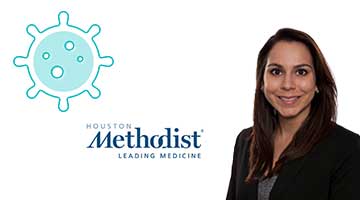Resources
Q&A: How VigiLanz is Supporting Remdesivir COVID-19 Clinical Trials
Insights from Katherine K. Perez, PharmD, BCIDP, Co-Leader of the Houston Methodist Remdesivir Clinical Trial Program
Hospitals across the country are using VigiLanz’s rules, reports, and real-time alerts to improve care for COVID-19 patients and prevent the virus’ spread to non-COVID patients and healthcare providers. But many hospitals are also using VigiLanz’s quick customization capabilities to address their unique COVID-19 needs.
One such hospital is Houston Methodist, which has been using VigiLanz Research Services to assist with its Remdesivir clinical trial program. In this Q&A, Katherine K. Perez, PharmD, BCIDP, Infectious Diseases and Antimicrobial Stewardship Clinical Specialist at Houston Methodist, discusses the exciting initiative and shares how VigiLanz is supporting the effort.
Q: Can you tell us about the Remdesivir clinical trial at Houston Methodist? What are some of your most exciting findings and where are you in the process?
Perez: We finished enrolling approximately 100 patients in the Remdesivir SIMPLE trials at the end of May. Since then we have completed follow-up visits and are responding to final data queries. Our findings were certainly in line with results from the trials that resulted in Remdesivir’s emergency use authorization (EUA) in May. Since then we have based our criteria for Remdesivir EUA use on the existing data from the clinical trials. We are still using our alerting mechanism for the trial cohort that we developed with VigiLanz to organize our RDV allocation workflow [learn more about this approach in the below question and answer]. At the moment we are a site for REMDACTA, which is another clinical trial that is comparing Remdesivir with Tocilizumab versus Remdesivir alone.
Q: How has VigiLanz supported your efforts?
Perez: We worked with VigiLanz Research Services to build out rules based on eligibility criteria that help us identify potential clinical trial patients. When patients match that criteria, we receive notifications from VigiLanz and we can quickly review that patient’s information and determine if the patient can and should participate. This process streamlines our workflows and ensures rapid identification of clinical trial candidates. We have trained up our research nurses and coordinators to also navigate the VigiLanz alerting and have made the program a cornerstone for their department’s workflow.
Q: On May 1, the FDA granted EUA for Remdesivir outside of clinical trials to treat certain patients with COVID-19. What role is VigiLanz playing, given the emergency use authorization?
Perez: We created alerts in VigiLanz so that whenever a patient meets the criteria for EUA, we receive an immediate notification. We expanded the alert across the system to trigger at all eight hospitals. Also, whenever we do get an allotment of the EUA inventory, we have to prioritize the use. VigiLanz alerts help streamline that process, the same way they help us identify clinical trial patients.
“We worked with VigiLanz Research Services to build out rules based on eligibility criteria that help us identify potential clinical trial patients.”
Q: What are some other ways Houston Methodist is using VigiLanz to navigate the COVID-19 pandemic?
Perez: VigiLanz has played a key role in helping us build our treatment database. We use it to store all of our COVID-19 related data from all of our hospital partners. This data includes COVID-19-positive patients, patients who have been treated with extracorporeal membrane oxygenation (EMCO), patients who have been readmitted, and more. Having the data in one centralized location helps us analyze it and evaluate critical metrics such as average length of stay, ventilator settings, and identification of co- and secondary infections. Our approach very much mirrors the World Health Organization ordinal scale, and all of the information we need is stored in VigiLanz. This registry is going to be really powerful as we move forward.
Also, in general during the height of the pandemic, VigiLanz’s ability to streamline workflows ensured that we didn’t fall behind on our everyday tasks or needs. For example, we are very focused on antimicrobial stewardship (ASP) here at Houston Methodist, and while our pharmacists have been inundated with COVID-19 needs, VigiLanz made it easy to temporarily hand off ASP tasks to other staff members who weren’t as familiar with those responsibilities.
Unlocking Patient Safety: The Power of Autodetection in Healthcare
The key to preventing safety events and reducing harm is not about what you know is happening, but what you don’t know. Hear from Dr. Chris Emerson on how autodetection can help healthcare leaders gain visibility into the true state of patient safety inside their institutions.
Enhancing Patient Safety with Automated Event Detection: A Hospital’s Guide
Discover the benefits of autodetection, why every hospital should deploy it, and how one innovative health system is using it to enhance patient safety.
